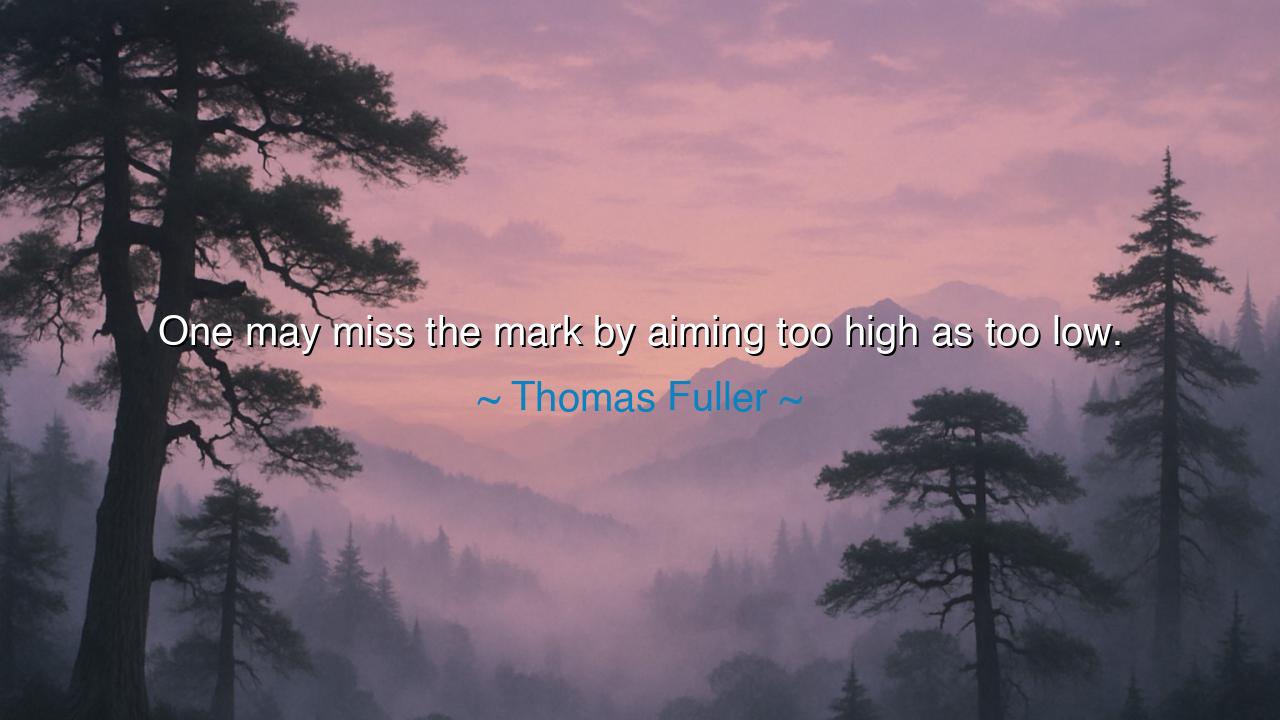
One may miss the mark by aiming too high as too low.






In the words of Thomas Fuller, the English preacher and historian whose maxims still shine with wisdom, we hear a teaching both subtle and profound: “One may miss the mark by aiming too high as too low.” At first hearing, it may seem only a warning of caution, yet beneath it lies the eternal balance that governs all human striving. For man must aim in order to achieve, but his aim must also be tempered with discernment. Too low an aim condemns him to mediocrity; too high an aim may overwhelm him with despair or ruin. The art of life is to find the noble center—high enough to inspire, grounded enough to achieve.
The origin of this saying lies in Fuller’s reflections on human ambition. Living in the seventeenth century, an age of civil war, religious conflict, and shifting fortunes, he saw many who destroyed themselves by reaching beyond their means, as well as many who wasted their lives by never daring to rise. Thus he forged this maxim, not to quench ambition, but to discipline it. To “miss the mark” is the great danger of life, whether through cowardice or recklessness, and so Fuller reminds us that wisdom must guide desire, lest desire consume us.
History is full of examples. Consider the tragic flight of Icarus, who, given wings of wax, soared too close to the sun. His ambition was high, his courage undeniable, but his wisdom failed him. His wings melted, and he fell to the sea. He missed the mark not because he lacked daring, but because his daring was not balanced with prudence. In contrast, his father Daedalus, who flew the middle path, survived. Here is the truth of Fuller’s teaching: both the timid and the reckless may perish, but the wise who balance their aim endure.
On the other side we may recall the story of Abraham Lincoln. Born in poverty, he might have aimed only to farm a small plot of land, content with little. But his vision reached higher—justice, union, and liberty. Yet Lincoln did not leap recklessly; he moved step by step, from lawyer to legislator, from speaker to president. His aim was high enough to change the course of history, yet grounded enough to be reached through perseverance. In him, ambition and prudence walked hand in hand, and he struck the mark where others would have missed it.
The meaning of Fuller’s words is this: ambition is a bow, and our dreams the arrow. If we aim too low, the arrow never leaves the ground, and our lives sink into triviality. If we aim too high without preparation, the arrow flies wild, missing the target altogether. But when our aim is lifted by courage and steadied by wisdom, we strike the center, and our lives find their purpose. Fuller does not warn against aiming high, but against aiming blindly, without measure or wisdom.
The lesson for us is eternal: let your goals be worthy, but let them also be tempered by clarity and patience. To aim too low is to insult your potential; to aim too high without grounding is to set yourself up for ruin. Wisdom is not the enemy of greatness—it is the guardian of it. The wise man dreams, but he also plans; he reaches for the heights, but he also plants his feet firmly on the earth.
Practical counsel is this: write down your aims, both near and far. Ask yourself: Is this aim so small it dishonors my gifts? Or so vast it ignores my limits? Adjust until you find the balance—lofty enough to inspire, but possible enough to pursue. Break great aims into smaller steps, as a climber scales a mountain peak by peak. In this way, you will neither settle in the valley nor fall from the sky, but ascend with steady strength until the summit is yours.
Thus, Fuller’s words endure across centuries: “One may miss the mark by aiming too high as too low.” They remind us that success is not found in reckless soaring nor timid crawling, but in the noble middle path where vision and wisdom unite. Children of tomorrow, heed this teaching: dream bravely, but dream wisely. Aim always, for it is better to try and fail than never to try—but let your aim be guided by reason, so that your arrow may fly true and strike the mark.






AAdministratorAdministrator
Welcome, honored guests. Please leave a comment, we will respond soon